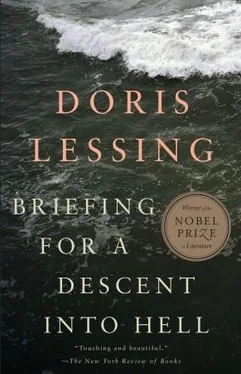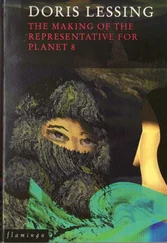When the war was over I took a plane to Belgrade, a train to the village we had visited that day, and walked with a friend into the mountains. The friend was now a government official, and he had been a member of our group — but after I left it. We met in London. Together we found that place on the mountainside by the by now old scars on the three trees. We put up a simple headstone. On it was this inscription:
KONSTANTINA RIBAR
PARTISAN
SHE GAVE HER LIFE FOR HUMANITY
And of course, for me.
By the time she was buried, the setting sun was straight above the peak I had to reach before moonrise. The glade was now flooded with yellow evening light. And as I picked up the packets and parcels of food and medicaments, trying to make two peoples’ burdens into a convenient load for one, I realised that all this time, two or three hours, or more, that deer had stood there, twenty paces away, among the rocks. I believe it was the sound of its hooves clicking on a stone that made me look up. It was still facing me, and its head again began to make the delicate sidling movements as I took a few steps nearer to pass it. On one of its horns was a stain — Konstantina’s blood, that might very easily have been mine. I stood still, looking at the beast. I did not understand. I could not understand why, having attacked and killed, it did not simply run away. That it should have stood there, watching me during my labour of digging out the forest floor, and then burying Konstantina, without coming nearer and making itself felt at all — I did not understand it. By now I had slid into that detached, dreamy state that follows an excess of emotion. That glowing little beast standing there, with its elegant horns lowered, apparently waiting, for no reason at all, only added to the sharp unfocus of the scene.
I stood opposite the beast and stared at it. I was about fifteen paces away. This time I saw that the beast was a doe. And that it had a loose staggering look to it — exhaustion. I saw that it had lately given birth. Then I saw the fawn.
The little creature lay beside the rocks facing towards the setting sun. Its softly glowing coat was full of health. Over it, as if standing on guard, was a tall plant, with clear bright leaves, that fanned and sprayed out all around the fawn, so that it lay under a fountain. The fawn was perfect, a triumph, too dazzlingly so, as if those vast mountains and forests had elected this baby animal in the sunny glade to represent them, but the scene was overcharged with meaning and with beauty.
Then I saw that on its hide lay some dried threads of the birth liquor, and on its creamy stomach lolled the fat red birth cord, fresh and glistening. Three or four days later, the cord would be withered and gone, the fawn’s coat licked and clean, the fawn, like a human child, or like the maize plants I had seen that morning, at a crest of promise and perfection. But to witness a birth is to be admitted into Nature’s workshop, and there life and death work together. The sight of the cord, the still unlicked coat, rescued the creature from pathos, restored it to its real vulnerability, its terrible weakness. Yet its eyes regarded me quietly, without fear. For between it and me stood its mother. I think that the fawn had not yet clambered to its feet. Probably the two soldiers, coming into the glade, had interrupted the birth scene, had in some way upset the mother and baby in the ritual they had to accomplish, had thrown things out of balance. And there stood the deer, and it was only now that I saw it was standing shakily, for its back legs trembled with weakness where they were planted on the soft grass.
I walked at a careful distance around the mother and her baby, keeping my eyes on the exhausted beast who slowly moved about to keep her lowered horns pointing at me. Behind her, the fawn lay presented in the glowing light under the plant, which was probably a fennel, or a dill.
I could only move slowly. I was carrying something like two hundred pounds of food and medicaments. When I reached the bottom of the glade, I looked back and saw that the fawn was in the act of struggling up on to its long slender fragile stalklike legs. The deer still watched me. And so I left the glade with its new grave, where the mother deer had one blood-dulled horn pointed at me, and the little fawn stood upright under its shining green fountain.
DEAR DOCTOR Y,
No, I am very sure that Charles Watkins was not at any time in Yugoslavia. I am unable to account for his insistance that he was there during the war. When I got back from the war, I was in fairly bad shape. This is what Charles and I had in common. We spent some months together in a cottage I had in Cornwall. We both talked a good deal about our experiences. This probably cured us both. Even after this lapse of time I could give you a pretty detailed account of Charles’ war, which is almost as vivid to me as “my” war. I find my memories of my two descents into Yugoslavia the most vivid of my life. If I were to forget those months, I would be forgetting events and people who formed me more fundamentally than any other. I suppose I could be regarded as lucky. I know that Charles thinks — or thought — that I was. “My” war was very different from his. I couldn’t say that I enjoyed “my” war, but it was certainly like being in a highly coloured dream, whereas I am afraid Charles’ war must have been like a long tedious nightmare. He had very much more than his fair share of boring repetitious slog, if you can agree that danger can be boring.
If I may intrude a personal note that is probably beyond what you asked for from me, I find the current scene frightening because yet again great numbers of young people, whether for or against war, whether they would welcome conscription or not, don’t know that the worst thing about war is that it can be so boring. I would never have believed that such a very short space of time — twenty-five years — would have again made it possible to see war as glamorous. The point is, you see, that “my” war was, rather, or for some of the time. Whereas Charles used to say that “his” war’s fortunes were maximum hard routine work, maximum physical discomfort, maximum boredom, and pretty steady doses of danger and death. This wasn’t necessarily true for all the men who got dealt his particular hand — Dunkirk, North Africa, Italy, Second Front. Some had quite extensive patches of respite and even enjoyment. But Charles’ luck was different. In fact it was a bit of a joke between us, when we traced his course of events, how he always seemed to have missed out on possible leave, or a lucky transfer to somewhere easier. We used to say that he had been fighting a modern war, for five years — I mean, of course, modern for then, he was fighting the Second World War — but that I had regressed to a much earlier style of war. Of course that is a pretty unsatisfactory generalisation when you think of the contribution guerrilla fighting made to our winning the war.
If Charles believes that I am dead, perhaps it might help to see that I am not?
Sincerely,
MILES BOVEY
DEAR DOCTOR X,
I am only too happy to come and see Charles any time it will help him. But I don’t want to bring James and Philip to see their father. I don’t think they ought to have that inflicted on them. I must say that I am surprised you suggest it at all. I know Charles is ill, but other people in the family are as important as he is. Of course it does not matter that it is painful for me to see Charles as he is now, but the boys are fifteen and fourteen years old and should be spared such things at their age. So I am afraid I am refusing to bring them.
Yours sincerely,
FELICITY WATKINS
DEAR DOCTOR Y,
Of course I am ready at any time to have my husband home. It will be very painful for us all, but I would do anything to help him get well again if you think it will help. I am sure that once he is in his own home and with his family and his own things around him he will remember who he is.
Читать дальше
Конец ознакомительного отрывка
Купить книгу










